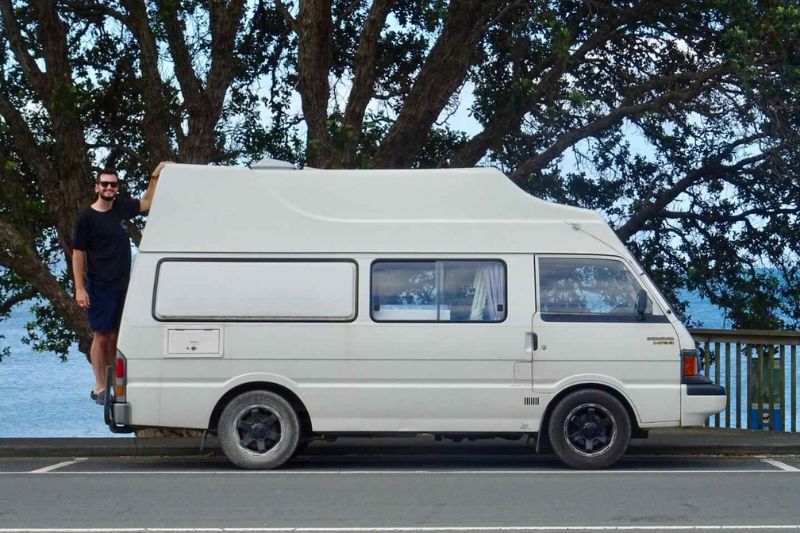Correct me if I’m wrong, but I would say experiencing ‘vanlife’ is on almost everyone’s bucket list. For someone who gets itchy feet, living in your own mobile home is ideal for giving yourself the freedom to explore wherever and whenever you want, by just rolling out of bed and driving off into the distance.
That’s how I’ve spent the last year as a digital nomad – in a vintage campervan that has taken me from the North, all the way to the very South of New Zealand. And although my Instagram tells stories of waking up next to mountains or photoshoots on the beach, there are some hidden challenges that come with the van-lifestyle.
In this article, I’ll take you through an honest guide of what to expect from vanlife as a digital nomad, tips for setting up your remote surf office, and the bumps (sometimes literally) you might experience on the road.
How to Choose the Right Campervan for Digital Nomad Life
If you’re going to be living in a van long-term, the most important thing is that a) you like it and b) it has everything you need to work remotely. Below are some considerations you should make to ensure your dream van is comfortable and keeps the digital nomad life as stress-free as possible.
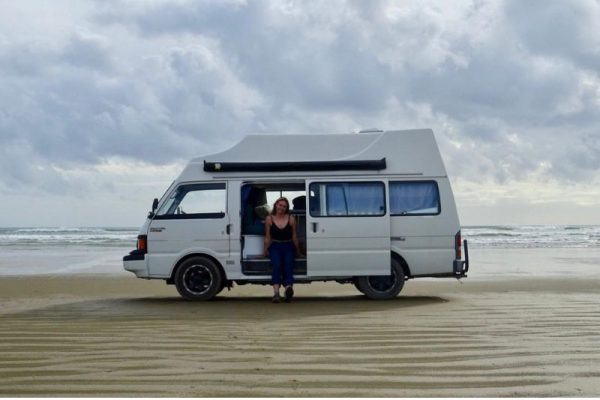
Best Types of Vans for Vanlife and Remote Work
In Australia and New Zealand especially, you won’t have to worry about a shortage of vans – in fact, you’ll probably be overwhelmed by choice. Typically, some of the main types of vans include:
- Vintage vans: Full of old-school charm and character, I have a soft spot for older style vans. Personally, I opted for a 1993 Ford Econovan, which was incredibly unique, and I could even stand up in it! The downside? A regular $1000 bill whenever I took it to the garage, as parts were so rare; so it’s important to weigh up personality and how much your budget can handle unexpected repairs.
- Converted vans: Converting a van is the ultimate project, as you can kit every inch of space out exactly how you want it. You can either buy a van pre-converted to suit your needs or do the DIY yourself – a great talking point with other travelers, too.
- Sprinter vans: These spacious, modern vans are a favorite among digital nomads for good reason – they’re reliable, comfortable, and offer enough headroom to stand and stretch (a luxury in vanlife!). That said, they come with a hefty price tag.
Essential Campervan Features for Working Remotely
Living on the road means your van setup needs to support your lifestyle and your laptop. Here are some pieces of equipment you should think about when you buy a pre-built van, or buy and install separately:
- Battery system and/or solar panels: Arguably, the most important part of working on the road is access to power. A second ‘leisure’ battery lets you charge devices while parked, and adding solar panels means you can stay powered up without needing to drive.
- Internet setup: Portable modems, SIM cards, or even satellite internet (hello, Starlink) are worth investing in if you’re working from anywhere.
- Storage: Nothing is more infuriating than having to squeeze yourself into uncomfortable spaces just to type out an article. Try to opt for a van that has a table setup that gives you plenty of room to relax, work and take calls.
- Insulation and ventilation: During the summer, vans can quickly become a sauna without proper ventilation, and unbearable in the winter without insulation. Make sure your van has both of these so you can work inside without cooking alive or losing feeling in your toes.
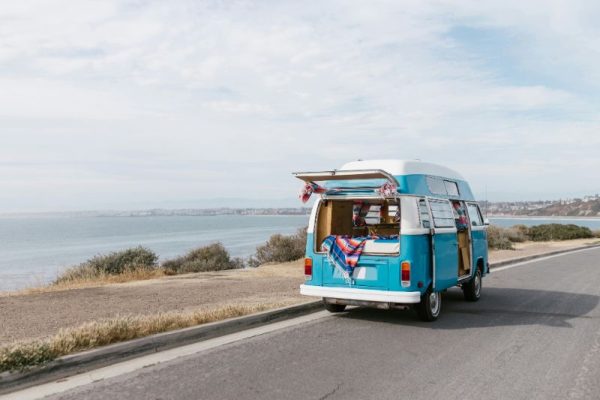
Best Campervan Features for Digital Nomad Surfers
If you’re a digital nomad surfer, one of your main concerns will be finding space for your surfboard and other equipment. Unless you want to sacrifice some of your clothes, consider buying a van that allows you to install a roof rack, or with underbed storage the board can easily slide under.
As there are many fellow digital nomad surfers out there, chances are you’ll buy a van from someone who has already factored this in!
Buying vs Renting a Campervan: What’s Best for Digital Nomads?
My recommendation is that if you’re travelling for more than two months, it’s more worthwhile to buy your own van than to rent one. That being said, if you’re unsure about whether vanlife is for you, renting is a great way to test the waters.
Depending on your destination, companies such as Indie Campers offer reliable campervans for short-to-medium-term adventures. A word of warning, though, renting can work out as extremely expensive, so make sure it’s the right option for you before going ahead.
Budgeting for vanlife
Vanlife can ultimately work out cheaper than city life, eliminating factors such as rent. However, when you begin your van hunt, remember to keep the following things in mind:
- Insurance
- Repairs and maintenance
- Petrol and gas costs
- Campground/accommodation fees, if freedom camping isn’t possible
- Additional money for equipment or gear needed for remote work
It’s a good idea to set a realistic budget and keep a backup fund in case of any surprises, especially if your van is a pre-2005 model.
The Day-to-Day Reality of Vanlife
Now you’ve got your van, what can you expect? There is a lot to love about this lifestyle, which is the reason I’ve been doing it for almost a year now. The best part is choosing the freedom where to wake up, spontaneously making your coffee with the mountains as your backdrop or finding the best sunset surf spots whenever you feel like it.
Overall, I’d say 95% of vanlife is experiencing unforgettable, once-in-a-lifetime memories, whereas the other 5% is… less glamorous.
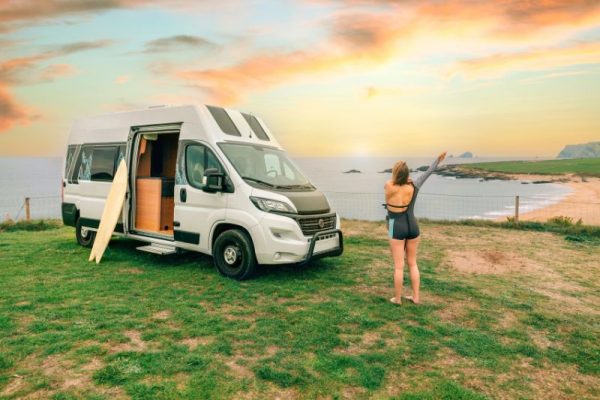
Making the Most of Less Space in a Campervan
Let’s be honest, no matter how big your van is, it will never be the same as living in a house. This can especially be felt when you’re living with a partner or friend, and you might find that you’re constantly in each other’s way, no matter where you’re sitting.
Less space also means clutter builds up a lot quicker, and you might find yourself feeling a bit overwhelmed with living in a messy environment. Dealing with these things all comes with establishing a routine and setting time aside to make sure everything has its own place and that it stays there.
I would say that the first week my boyfriend and I bought our van, we had more arguments than we’d ever had in our entire relationship – (why would anyone keep their socks in the food cupboard?!).
Staying Hygienic While on the Go
Probably one of the least talked about things when it comes to vanlife – showers and toilets. Unless you’re lucky enough to have a van with a built-in shower, you’ll probably find yourself going a few days without. This doesn’t mean that you’re going to be smelly forever, though, as there are ways to stay hygienic by getting creative. You can find public showers at beaches, at gyms and swimming pools, or buy a solar shower (just make sure it’s a sunny day!).
Toilets are another fun challenge. Most vans, especially in New Zealand, require you to have a fixed toilet, but emptying it can be an extremely unpleasant job. Luckily, there are usually plenty of public bathrooms dotted around to help you avoid any emergencies.
To make this aspect of life easier, I strongly recommend downloading the Campermate app to plan each road trip around public amenities, as well as finding free camping spots.
Cooking in a Confined Kitchen
Once again, a smaller space means a smaller kitchen. Vans often only have one or two hob rings, which can leave you juggling when trying to plan a big meal.
Over time, you’ll become acquainted with what you can and can’t cook in a confined space and build up a list of recipes you enjoy that are hassle-free. For me, you can never go wrong with spaghetti bolognese or chilli con carne, both of which can be left simmering in one pot.
If your van doesn’t have an indoor kitchen setup, then I recommend finding camping spots that provide you with shelter to keep yourself warm while you cook.
Mental Health on the Move
If you’re traveling alone, life on the road can become lonely if you have no one to share it with. Homesickness, especially during holidays or tough days, is real. So is burnout if you don’t give yourself enough rest.
To cope, I plan regular calls with friends, take breaks from social media, and encourage myself to go out and do ‘regular life’ activities, such as joining pilates or yoga classes to meet new people.
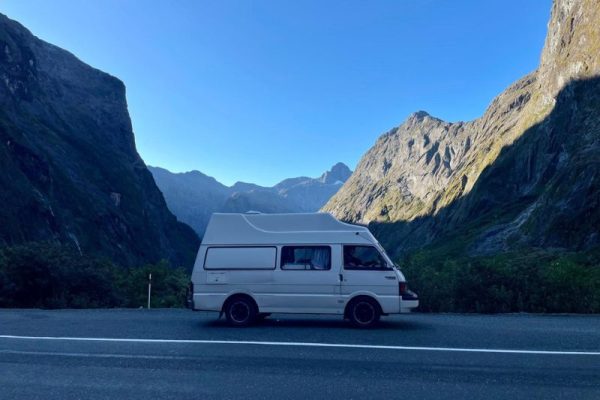
Breakdowns and Repairs
As touched on, with vanlife also comes the occasional unexpected mechanical hiccup. These can range from minor, such as a flat battery, to more serious issues, such as engine problems that leave you stranded.
With this, regular check-ups and a basic toolkit go a long way, but there will still be moments where you’re Googling symptoms and hoping for the best while waiting for a mechanic. It’s frustrating in the moment, but it teaches you patience, problem-solving, and the importance of having a solid roadside assistance plan.
I recommend getting an AA or other roadside assistance membership for emergency callouts, as they can also provide you with accommodation while your van is being towed to a garage (but fingers crossed that will never happen!).
Staying Sustainable While Living Vanlife as a Digital Nomad
Recently, the New Zealand government has cracked down on updating freedom camping laws to protect the environment. Beyond legal requirements, it’s important to embrace sustainable practices and adhere to the ‘leave no trace’ motto, no matter where you are in the world.
This means making sure all waste (grey water, toilet waste and rubbish) is disposed of in official facilities, which can be found on the Campermate app.
Conclusion
Experiencing vanlife as a digital nomad is one of the greatest things you’ll ever do. Even though the lifestyle isn’t always picture-perfect, every bump in the road is part of the adventure. One thing is for sure: you’ll definitely learn a lot about yourself and how to handle stressful situations!
For more advice on how to live as a digital nomad around the world, or where to find the best surfing spots, check out our other articles and be sure to follow us on Instagram.

